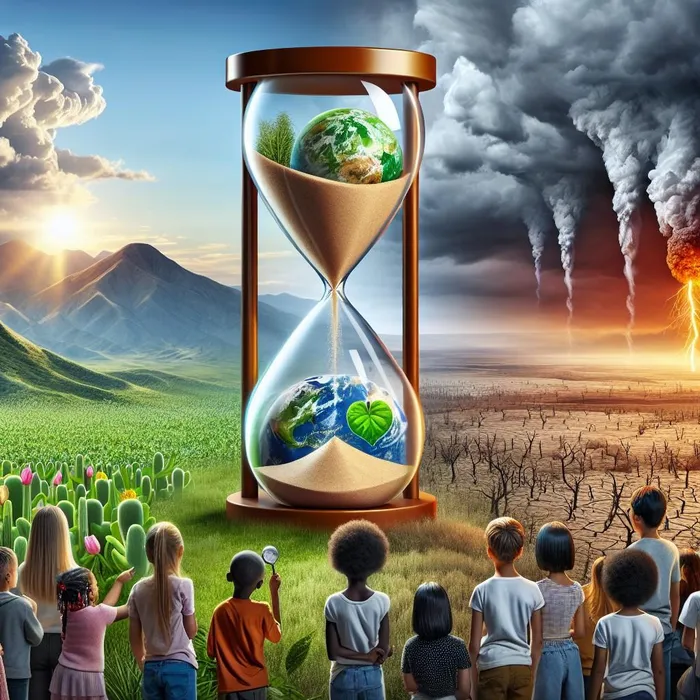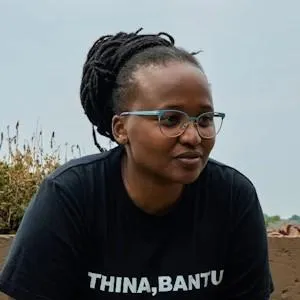
Climate change is a “common concern for humankind", says the author.
Image: AI Lab
Ahead of COP30 in Belem, Brazil, countries that are parties to the Paris Agreement will submit their Nationally Determined Contributions (NDCs) for 2030–2035, as states acknowledge that climate change is a “common concern for humankind” for both present and future generations.
When planning and implementing climate action, states must respect, promote, and consider intergenerational equity, which simply means equity means fairness among generations, with an equitable and just distribution of benefits and risks.
Drawing from the open and frank arguments in the Commission, Commissioner Louise Naudé aptly reflects, “I don't know whether to wish that my son would have a child, or to hope that he won't. With the critical decade for climate mitigation action flying by and the dishearteningly slow and limited mitigation action underway, it seems any child born now is facing an ever-worse climate catastrophe in a world of economic inequity!”
The duty of ensuring equity between generations is not only an international obligation but is also found in section 24 of the South African Constitution, which states that: “Everyone has the right …to have the environment protected, for the benefits of present and future generations…”.
Earlier this year, the Supreme Court of Appeal upheld the principle of intergenerational equity in the landmark judgment of Minister of Environmental Affairs v Trustees of Groundwork Trust (#DeadlyAir). The Court confirmed the state’s constitutional obligation to protect public health; the best interest of children being considered in all matters concerning them and affirmed the duty of the state to respect the environmental rights of future generations. This ruling reflects a growing recognition that climate governance must take accountability for the needs and rights of the people.
Globally, climate justice movements have set similar precedents, where governments are held accountable for intergenerational justice. Courts in several countries have ruled that governments must implement stronger and more ambitious climate measures to ensure that the future generations do not inherit unsustainable debt and environmental destruction but rather inherit dignity and opportunity.
Reflections on the PCC Recommendations
To what extent do the Presidential Climate Commission’s (PCC) recommendations for South Africa’s updated NDC take intergenerational equity into account?
The PCC recommendations for South Africa’s 2030–2035 NDC place substantial emphasis on intergenerational equity and justice, even though they do not always use that exact phrase. Instead, they frame these duties in terms of creating a just, inclusive, and sustainable future that explicitly considers the well-being of future generations.
The recommendations are explicitly framed around procedural, distributive, and restorative justice. This includes reducing structural inequalities and ensuring benefits are equitably distributed, so that climate action today does not burden future generations with more profound inequality or stranded, high-carbon assets. The PCC’s justice framing implies that climate impact and access to the transition are not uniform but intersectional as they differ across all social groups. Marginalised groupings such as women and the youth often face greater climate and economic risks, and these inequities must be addressed to ensure a just transition for all. Various PCC reports have voluminously reiterated the economic, social and livelihoods impacts of climate change such as increased exposure to heat stress, respiratory illnesses and vector-borne diseases, decreasing agricultural outputs, damage to social and critical infrastructure, thus constraining growth in some of our supposedly competitive industrial sectors.
By emphasising new economic clusters, in green industries, the PCC remains public defender and proponent of a just transition which must navigate the precarious struggle between ambition and our economic realities, to addressed with full regards to procedural, restorative and distributive justice, aiming for more ambitious emissions reduction with a “no regrets pathway” for now and tomorrow
However, for these strategies to deliver to posterity, they have to go along with measures to address the economic failures that have nourished the perpetuation of inequality, poverty and a burning, drowning and freezing and wretched planet. If these measures are not elevated, all which the current generation of workers will retire with nothing, but a souvenir chisel and blurred memories of the erstwhile benefits of a fossilised economy
What is to be done?
To borrow from Franz Fanon in the Wretched of the Earth., our determination is inspired by the saying “Each generation must… discover its mission, fulfil it, or betray it”.
South Africa must implement a just transition now that avoids passing ecological, social, or economic debt onto future generations. Encouragingly, we are witnessing children and young people become champions of climate justice — not only for themselves, but for their children and their grandchildren. The future has returned on the streets protesting, in conversation with governments and companies, and litigating against taking government and business t for environmental justice, with over 80 cases worldwide to defend their human rights and those of generations yet to come.

Mbali Baduza, Commissioner at the Presidential Climate Commission
Image: Supplied

Lebohang Ntuli, Chairperson of Advocate for Climate Justice South Africa.
Image: Supplied
Mbali Baduza, Commissioner at the Presidential Climate Commission. Lebohang Ntuli, Chairperson of Advocate for Climate Justice South Africa. Both Lebohang and Mbali are members of the Presidential Climate Commission Youth Leaders Caucus.
BUSINESS REPORT